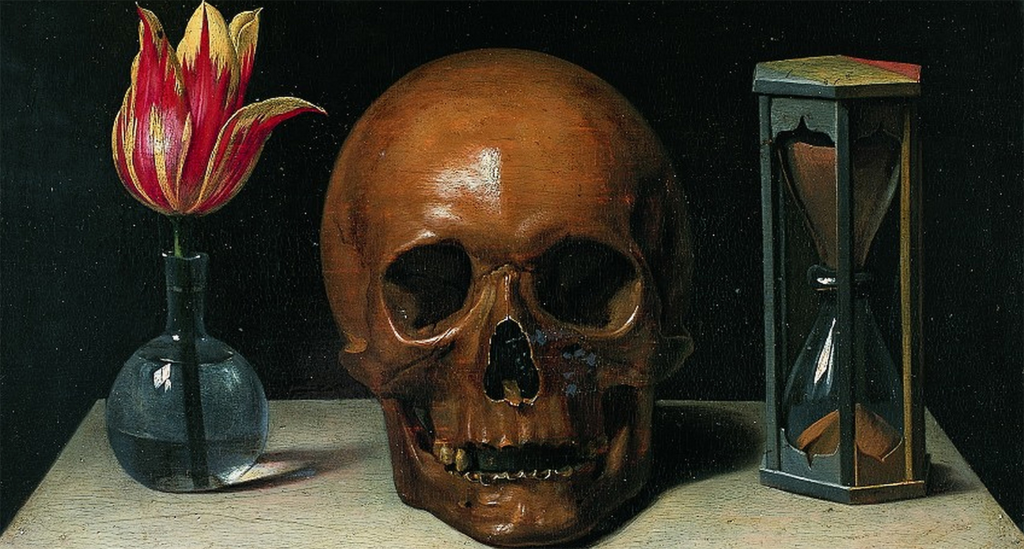Life is a precious gift. It’s fleeting, and every day seems to go by faster as we get older. Do you live life to the fullest? Or do you sometimes feel like you’re just going through the motions? If you want to learn how to appreciate every moment and live life to the fullest, then you need to learn about memento mori. In this blog post, we will discuss what memento mori means and how it can help us live a more fulfilling life!
Memento Mori Meaning

Memento Mori is a Latin phrase that means “remember thou art mortal.” It is a reminder of our mortality and the importance of living each day fully. This phrase, which teaches us to live life to the fullest, can be best depicted through the image above, painted by Philippe de Champaigne in 1671. The painting features three components:
An hourglass: To symbolize the passage of time and how quickly it passes us by; That if we don’t cherish each moment it shall pass quicker than we expect.
A flower: To symbolize the beauty and fragility of life; A reminder that at some point even the beauty of nature will decay.
A skull: To remind us of our mortality; That every day could be our last and we will all eventually die. Not just us, but also the people around us, including our loved ones.
Memento Mori reminds us that today could be the last day we walk the Earth. It teaches us that we have a limited amount of time to do the things we want to do. As Marcus Aurelius once said “You could leave life right now. Let that determine what you do and say and think.” In other words, if today was the day you died, what would you do?
Applying Memento Mori to our Lives
Live Your Own Life to the Fullest
Memento Mori teaches us to live each life as if it were our last because it very well might be. Do you want to show appreciation for your loved ones? Tell them you love them. Do you have unfinished business? Now is the time to take care of that.
Memento Mori is an excellent tool to combat one of the worst habits of humanity: procrastination. Procrastination is only possible if we believe we have enough time to do something later. But if we live our lives with the knowledge that today could be our last, then we will naturally want to do things now rather than later. Death is an impossible consequence of life, so we must appreciate the time given to us and not squander it by doing worthless things.
Cherish Every Moment You Have with Others
Memento Mori can also help prepare us for the death of others. Yes, there will be times in our lives when we will lose the people we love. Just look at human history or what’s happening in the world right now: the world is full of death. And it is truly hard to deal with. Most of us will have to go through various stages of grief when someone we love dies.
Reminding ourselves of the possibility that we can lose a loved one as we speak helps us value the time we have. It teaches us to cherish the time we have with them. If you want to call your parents or grandparents, do it now. You never know when they might be gone.
Furthermore, if we are aware of the fact of death, we may develop a healthier attitude toward potential loss by adopting this attitude. Instead of clinging to a person, wishing that we will never get separated, we can embrace the reality that the day of separation will come. This doesn’t mean that we shouldn’t grieve and mourn; it means that we were prepared all along. We can be more functional and helpful human beings to the community when death occurs.
“Don’t look down on death, but welcome it. It, too, is one of the things required by nature. Like youth and old age. Like growth and maturity. Like a new set of teeth, a beard, the first gray hair. Like sex and pregnancy and childbirth. Like all the other physical changes at each stage of life, our dissolution is no different.”
Marcus Aurelius
Memento Mori Teaches us that Death is Uncertain
What happens after we die? Some people believe in reincarnation, while others believe in an afterlife. Will we enter through the gates of heaven? Or will we enter the eternal nothingness? Will we return to the flesh again for another life on planet Earth? No one knows for sure. But what we do know is that mortality is upon us; we will not live here forever.
This uncertainty is a good thing. It should remind us to live life to the fullest and appreciate every moment. In combination with Amor Fati, Memento Mori allows us to live our lives with meaning. So when death smiles at us no matter where we go, is there a better response than to smile back?
